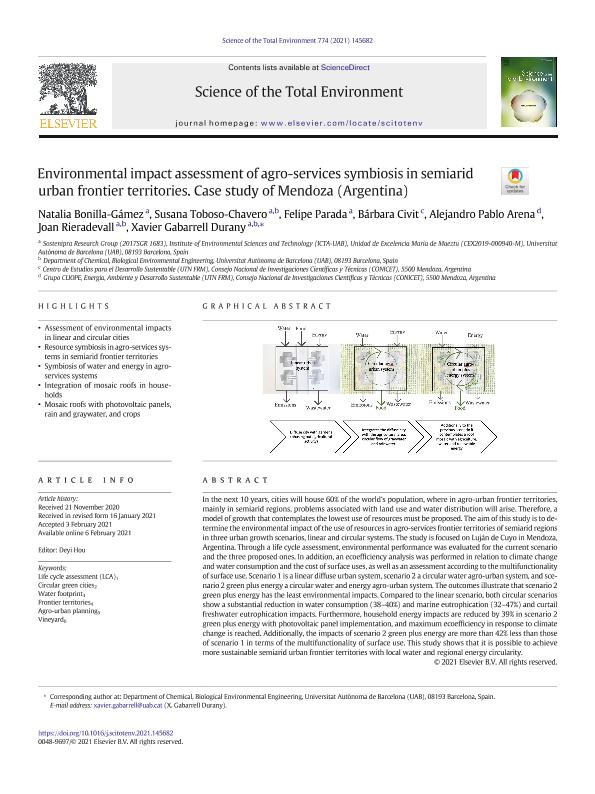Mostrar el registro sencillo del ítem
dc.contributor.author
Bonilla, Natalia
dc.contributor.author
Toboso, Susana
dc.contributor.author
Parada, Felipe
dc.contributor.author
Civit, Bárbara María

dc.contributor.author
Arena, Alejandro Pablo

dc.contributor.author
Rieradevall, Joan
dc.contributor.author
Gabarrell Durany, Xavier
dc.date.available
2023-08-15T17:46:01Z
dc.date.issued
2021-02
dc.identifier.citation
Bonilla, Natalia; Toboso, Susana; Parada, Felipe; Civit, Bárbara María; Arena, Alejandro Pablo; et al.; Environmental impact assessment of agro-services symbiosis in semiarid urban frontier territories: Case study of Mendoza (Argentina); Elsevier Science; Science of the Total Environment; 774; 2-2021; 1-12
dc.identifier.issn
0048-9697
dc.identifier.uri
http://hdl.handle.net/11336/208383
dc.description.abstract
In the next 10 years, cities will house 60% of the world's population, where in agro-urban frontier territories, mainly in semiarid regions, problems associated with land use and water distribution will arise. Therefore, a model of growth that contemplates the lowest use of resources must be proposed. The aim of this study is to determine the environmental impact of the use of resources in agro-services frontier territories of semiarid regions in three urban growth scenarios, linear and circular systems. The study is focused on Luján de Cuyo in Mendoza, Argentina. Through a life cycle assessment, environmental performance was evaluated for the current scenario and the three proposed ones. In addition, an ecoefficiency analysis was performed in relation to climate change and water consumption and the cost of surface uses, as well as an assessment according to the multifunctionality of surface use. Scenario 1 is a linear diffuse urban system, scenario 2 a circular water agro-urban system, and scenario 2 green plus energy a circular water and energy agro-urban system. The outcomes illustrate that scenario 2 green plus energy has the least environmental impacts. Compared to the linear scenario, both circular scenarios show a substantial reduction in water consumption (38–40%) and marine eutrophication (32–47%) and curtail freshwater eutrophication impacts. Furthermore, household energy impacts are reduced by 39% in scenario 2 green plus energy with photovoltaic panel implementation, and maximum ecoefficiency in response to climate change is reached. Additionally, the impacts of scenario 2 green plus energy are more than 42% less than those of scenario 1 in terms of the multifunctionality of surface use. This study shows that it is possible to achieve more sustainable semiarid urban frontier territories with local water and regional energy circularity.
dc.format
application/pdf
dc.language.iso
eng
dc.publisher
Elsevier Science

dc.rights
info:eu-repo/semantics/openAccess
dc.rights.uri
https://creativecommons.org/licenses/by-nc-nd/2.5/ar/
dc.subject
AGRO-URBAN PLANNING5
dc.subject
CIRCULAR GREEN CITIES2
dc.subject
FRONTIER TERRITORIES4
dc.subject
LIFE CYCLE ASSESSMENT (LCA)1
dc.subject
VINEYARD6
dc.subject
WATER FOOTPRINT3
dc.subject.classification
Otras Ciencias de la Tierra y relacionadas con el Medio Ambiente

dc.subject.classification
Ciencias de la Tierra y relacionadas con el Medio Ambiente

dc.subject.classification
CIENCIAS NATURALES Y EXACTAS

dc.title
Environmental impact assessment of agro-services symbiosis in semiarid urban frontier territories: Case study of Mendoza (Argentina)
dc.type
info:eu-repo/semantics/article
dc.type
info:ar-repo/semantics/artículo
dc.type
info:eu-repo/semantics/publishedVersion
dc.date.updated
2023-08-15T12:27:09Z
dc.journal.volume
774
dc.journal.pagination
1-12
dc.journal.pais
Países Bajos

dc.journal.ciudad
Amsterdam
dc.description.fil
Fil: Bonilla, Natalia. Universitat Autònoma de Barcelona; España
dc.description.fil
Fil: Toboso, Susana. Universitat Autònoma de Barcelona; España
dc.description.fil
Fil: Parada, Felipe. Universitat Autònoma de Barcelona; España
dc.description.fil
Fil: Civit, Bárbara María. Consejo Nacional de Investigaciones Científicas y Técnicas. Centro Científico Tecnológico Conicet - Mendoza; Argentina
dc.description.fil
Fil: Arena, Alejandro Pablo. Consejo Nacional de Investigaciones Científicas y Técnicas. Centro Científico Tecnológico Conicet - Mendoza; Argentina
dc.description.fil
Fil: Rieradevall, Joan. Universitat Autònoma de Barcelona; España
dc.description.fil
Fil: Gabarrell Durany, Xavier. Universitat Autònoma de Barcelona; España
dc.journal.title
Science of the Total Environment

dc.relation.alternativeid
info:eu-repo/semantics/altIdentifier/doi/https://doi.org/10.1016/j.scitotenv.2021.145682
Archivos asociados
